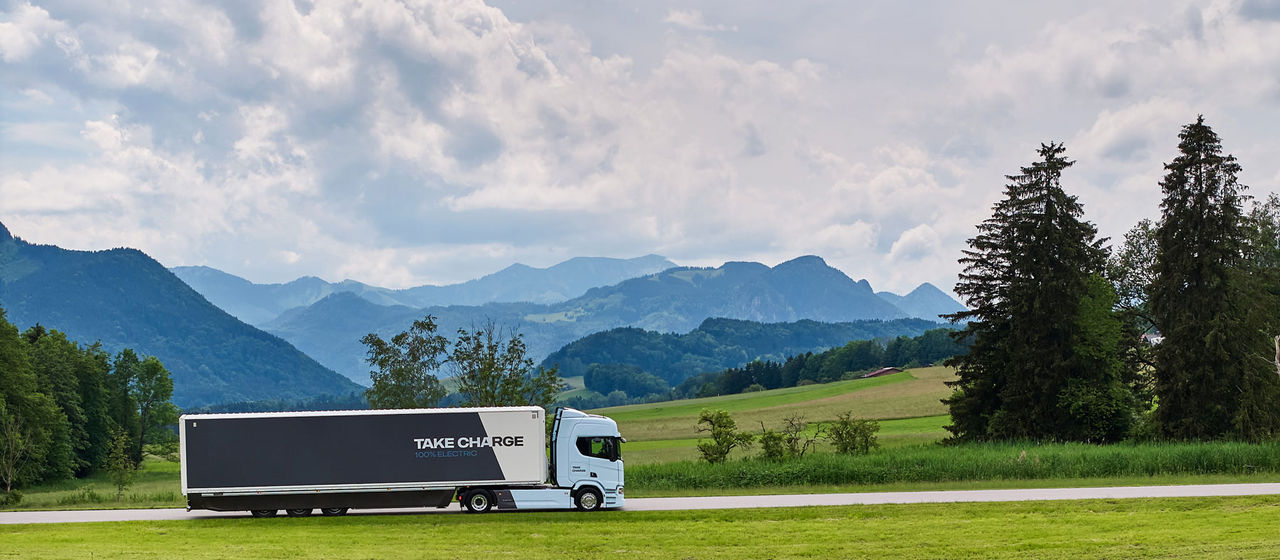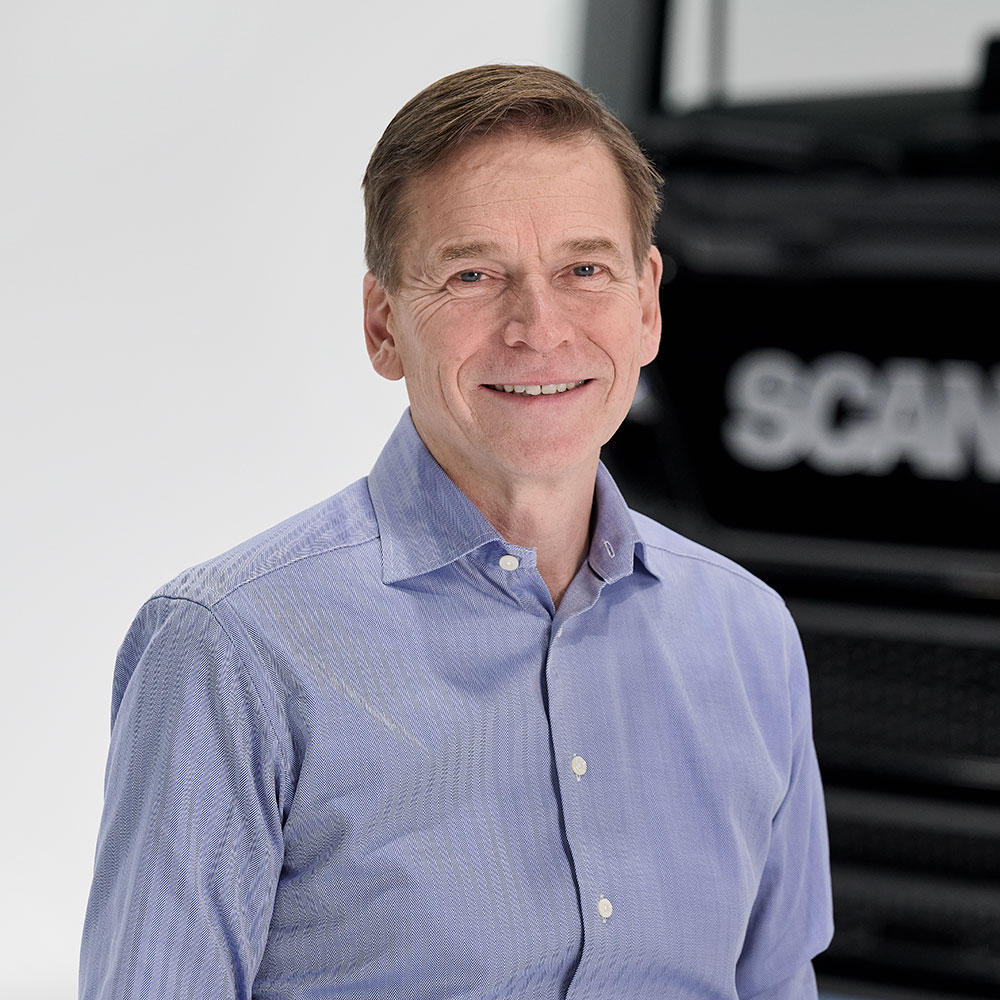
CEO statement
2024 was an exciting but sometimes frustrating year, with financial results at an all-time high but also delivery problems and challenges in our battery electric vehicles ramp-up. Despite this we made good progress in transitioning to sustainable transport through new partnerships, products and services.
Business highlights
Firstly, to the positives. We saw robust demand for our products and services throughout the year and delivered an outstanding financial performance. I am proud that Scania delivered at record levels in 2024 despite macroeconomic and geopolitical concerns, finally reaching over 100,000 vehicles. Thanks to resolving many of the supply chain issues, we had the most stable production flow since the pandemic. We captured market share in Europe and Latin America: a testament to the excellence of the Scania Super driveline and the successful reduction of our order book to more normal levels.
Demand for trucks was more hesitant in Europe compared with previous years. In contrast, demand in Latin America continued strongly, with good momentum particularly in Brazil. Once again, we reaped the benefits of having a global production system, with hubs in both Europe and Latin America balancing regional fluctuations in demand.
In 2024, we hit a milestone as we reached half a million trucks produced in Brazil since we started the production there in 1957 – an impressive figure reflecting the dedication of many colleagues. Thanks to our truly global product and production system, a Scania is a Scania anywhere in the world.
The production hub in Brazil supplies our premium products not only to the Brazilian market, but to some 30 markets in, and outside of, Latin America. The upcoming establishment of our third industrial hub in China will create even more of this global resilience in our business. The new plant, which is due to start production at small scale this year, will deliver our products to customers in China and wider Asia with a set-up of regional supply chains, manufacturing and commercial operations.
Among a range of product and service launches and business milestones in 2024, a major highlight was making Scania autonomous vehicles commercially available – a key step in the road towards a safe, decarbonised future transport system. We also launched start-ups to accelerate the sustainable transition of transport. One great example is Erinion, a company that will support the adoption of electric trucks by installing charging points at customer locations across Europe.
Finally, we were honoured to receive the Green Truck Award 2024. Scania has won the prestigious annual award seven times out of the last eight years, and I think that is a remarkable achievement. We were also delighted to be awarded the Sustainable Bus Award 2025 in the coach category for the liquid biogas/natural gas variant of our Scania Touring coach.

”We saw robust demand for our products and services throughout the year and delivered an outstanding financial performance.”
Christian Levin
President and CEO, Scania and TRATON GROUP
Delivery and battery electric vehicle ramp up challenges
Alongside these successes, we also faced challenges. Updating our software platform to meet new cybersecurity legislation while also ensuring new, value-adding functionality for our customers proved to be a bigger challenge than anticipated. Complexity and quality issues in the implementation of the software meant that many of our customers had to wait too long for their vehicles to be delivered. Letting customers down is not acceptable, and I can assure you that everyone at Scania is doing their utmost to resolve these issues.
In another setback, our ramp up of battery electric trucks did not move as quickly as we had intended, due partly to supply chain issues. Converting an entire industrial system to electrification is a major undertaking that requires new types of partnerships and taking bold decisions in often unchartered territories. We are doing everything in our power to shape this new ecosystem, investing our time, money, and competence. Battery electric trucks require a vast number of completely new components, and many of them come from suppliers we are forging new partnerships with.
Not all endeavours will be successful. But the transition to electric is core to Scania’s business strategy, and we are focused on establishing the resilient supply chains needed to make large-scale electrification feasible across different regions and applications.
The ramp-up delay in turn affected our progress in decarbonisation, a key strategic priority for our business. Back in 2020, we set a benchmark by becoming the first OEM in our industry to set science-based carbon reduction targets not only for our own operations (scope 1 and 2), but also crucially for our vehicles when in use by our customers (scope 3). Thanks to the focused work of everyone across our organisation, we are set to overperform on our scope 1 and 2 targets. However, despite great progress in mitigating measures such as optimal vehicle specification and driver coaching, we are not on track to fully achieve our ambitious scope 3 target.
Our commitment to decarbonising our business in line with science is unwavering, and we are determined to do all we can to narrow the gap as we approach our 2025 target horizon. We have also introduced new targets for 2032 across all scopes to ensure our continued efforts and full focus in the years ahead.
Overcoming the barriers
Overcoming the barriers to adopting sustainable transport is a complex challenge that demands action on several different fronts. Firstly, it’s about recognising that there is no one-size-fits-all solution: different markets require different solutions. While we know electrification is key in achieving decarbonisation, at the same time the wider adoption of biofuels will also be required as an interim solution, and in some cases the endgame. Here, Scania’s modular approach gives us an advantage as we can easily adjust our products and services to fit local requirements and legislation.
Secondly, the transport ecosystem needs to work together to clearly demonstrate the business case for widespread electric vehicle adoption. This year for example, we collaborated with SKF, through Scania’s LOTS Group, to launch one of Europe’s longest routes for electric trucks. The initiative is a valuable test-case proving that, with the right logistical planning, using electric trucks for goods transport is not only sustainable but also highly cost effective.
Finally, we acknowledge that, for customers, sustainable transport involves navigating a whole new set of complex issues and business uncertainties. Scania’s job is to be the trusted advisor in this new business reality and continue ensuring that our customer’s profitability and sustainability goes hand in hand. Our solutions offering covers a wide range of services designed to support customers as they step into this new reality, from monitoring, analytics and CO2 tracking (all building on data and connectivity), to providing depot charging and access to public charging.
We need to support our customers in reducing as much as possible of the complexity and risk, and increase their flexibility. One recent example is JUNA, a joint venture partnership solution that gives customers access to electric trucks on a pay-per-use basis, thereby removing the risks of full ownership.
Bold leadership
Taking action to overcome these barriers is essential, but they will only get us so far.
To accelerate the transition, we need to get the enabling conditions for sustainable transport in place – and that depends on will and ambition from leaders across the whole transport ecosystem. In particular, we need a favourable policy and regulatory environment that creates customer confidence and encourages investment in infrastructure, grid modernisation and green energy production. I am deeply concerned that faltering political support for zero emissions commitments is slowing the pace of change.
We urgently call on politicians and governments to show coordinated leadership on this issue.
I am convinced that the winners in the new ecosystem of transport and logistics will be the ones who embrace change, turn risks into green opportunities and demonstrate bold, brave and sometimes stubborn leadership. They will be the ones who forge new partnerships across the ecosystem and team up. For Scania, being part of TRATON GROUP means we can stay on top of development and continue strengthening our premium position in a fast-changing world.
I also believe strongly that none of this would be possible without the continuing commitment and dedication of our people. On that note, I want to thank everyone in our Scania family – employees, customers and partners – for their contribution and support during a turbulent year. I look forward to a successful and productive year ahead as we continue to drive the shift together towards a sustainable transport system.
Christian Levin
President and CEO, Scania and TRATON GROUP